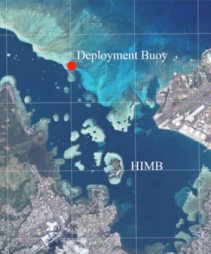Alliance for Coastal Technologies (ACT) Demonstration Study
The Scenario
Accurate measurements of pCO2 in the oceans are critical for determining the distribution of ocean sources and sinks, understanding ocean uptake of CO2 and monitoring the progress of ocean acidification.
The Challenge
Pro-Oceanus Systems was invited to participate in the Alliance for Coastal Technologies (ACT) demonstration study to determine if the technology embodied by commercially available submersible pCO2 sensors was sufficiently mature to provide accurate and stable measurements of pCO2 in time series.
The Solution
In October 2009 the Alliance for Coastal Technologies conducted a demonstration study to determine feasibility of measuring pCO2 using in situ instrumentation. Pro-Oceanus Systems was one of three manufacturers of submersible CO 2sensors to participate in the ACT sponsored study in Kaneohe Bay, Hawaii. The measurements were made on the edge of a healthy coral reef where tidal flows and the cycle of photosynthesis and respiration caused pCO2 levels to vary by nearly 400 µ-atm in a tidal cycle. Of submersible sensors, only the CO 2-Pro™ gave results that fell within the estimated error of wet chemical measurements made by ACT scientists.


GRAPH: ACT trial results (blue dots: ACT data; red line CO 2-Pro™ data)
MAP: Study location adjacent to a healthy coral reef in Kaneohe Bay, Hawaii
Summary
Pro-Oceanus scientists participated in the Alliance for Coastal Technologies demonstration project for submersible pCO 2 sensors in Kaneohe Bay, Hawaii. Results showed that of the three submersible sensors commercially available, only the Pro-Oceanus CO 2-Pro™ gave measurements that fell within the estimated error of the wet chemical measurements made by ACT personnel.